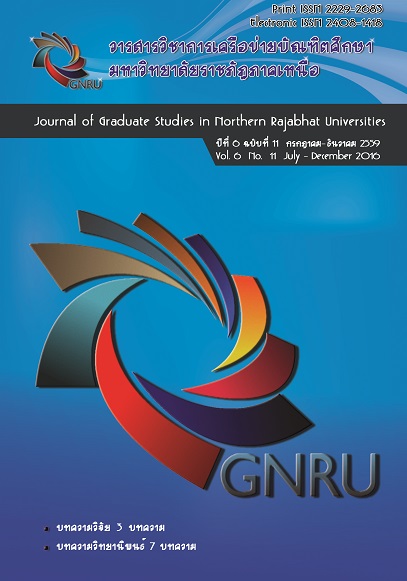ผลการใช้รูปแบบการเรียนรู้วิทยาศาสตร์ตามแนวคิดการใช้ปัญหานำทางและการวิพากษ์วิจารณ์ ทางสังคมและแนวคิดวิทยาศาสตร์ เทคโนโลยีและสังคมเพื่อส่งเสริมการรู้วิทยาศาสตร์ สำหรับนักเรียนชั้นมัธยมศึกษาตอนต้น; The Effect of Using Science Learning Model Based on Scio-Cr
Main Article Content
Abstract
บทคัดย่อ
การวิจัยในครั้งนี้มีวัตถุประสงค์เพื่อศึกษาผลการใช้รูปแบบการเรียนรู้วิทยาศาสตร์ตามแนวคิด การใช้ปัญหานำทางและการวิพากษ์วิจารณ์ทางสังคมและแนวคิดวิทยาศาสตร์ เทคโนโลยีและสังคม เพื่อส่งเสริมการรู้วิทยาศาสตร์ สำหรับนักเรียนชั้นมัธยมศึกษาตอนต้น กลุ่มตัวอย่างที่ใช้แบ่งออกเป็น 2 กลุ่มคือ กลุ่มทดลองเป็นนักเรียนชั้นมัธยมศึกษาปีที่ 1 ที่เรียนด้วยรูปแบบการเรียนรู้ที่ผู้วิจัยพัฒนาขึ้น และ กลุ่มควบคุมที่เรียนตามปกติ เครื่องมือที่ใช้ในการวิจัยประกอบด้วย แผนการจัดการเรียนรู้และแบบวัดการรู้วิทยาศาสตร์ ผลการวิจัยสรุปได้ว่า 1) นักเรียนกลุ่มทดลองมีคะแนนเฉลี่ยการรู้วิทยาศาสตร์ในภาพรวมและรายด้านหลังเรียนสูงกว่าก่อนเรียนอย่างมีนัยสำคัญทางสถิติที่ระดับ 0.01 2) นักเรียนกลุ่มทดลองมีคะแนนเฉลี่ยการรู้วิทยาศาสตร์ในภาพรวมหลังการทดลองสูงกว่ากลุ่มควบคุมอย่างมีนัยสำคัญทางสถิติที่ระดับ 0.01 และมีคะแนนเฉลี่ยด้านการระบุประเด็นทางวิทยาศาสตร์ ด้านการอธิบายปรากฏการณ์ในเชิงวิทยาศาสตร์ ด้านการวิพากษ์วิจารณ์ทางสังคม และด้านการตระหนักถึงความสำคัญและผลกระทบทางวิทยาศาสตร์และเทคโนโลยีต่อตนเองและสังคมสูงกว่ากลุ่มควบคุมอย่างมีนัยสำคัญทางสถิติที่ระดับ 0.01 ส่วนคะแนนเฉลี่ยด้านการใช้ประจักษ์พยานทางวิทยาศาสตร์สูงกว่ากลุ่มควบคุมอย่างไม่มีนัยสำคัญทางสถิติ
Abstract
The purpose of this research was toexamine the effectiveness of Science Learning Model Based on Scio-Critical and Problem-Oriented Approach and Science Technology and Society Approachto promoting scientific literacy for lower secondary students. The samples were two classroomsofMathayomsuksa 1 students. One classroom was an experimental group studiedwith the developed learning model whereas the other was serving as a control group studied with the traditional instruction. Research instruments consisted of thelesson plans and the scientific literacy test. The results indicated that 1) the posttest score on scientific literacy of the experimental groupwas higher than the control group at the 0.01 level of statistical significance 2) the posttest score on scientific literacy of the experimental groupwas higher than the posttest score on scientific literacy of the control group at the 0.01 level of statistical significance and the score ofIndentifying Scientific Issues Explaining Phenomena Scientifically Socio-Critical discussion and An awareness of the impact of science and technology on individuals and on society were higher than the control group at the 0.01 level of statistical significance except using scientific evidence was higher than the control group non-significantly difference


